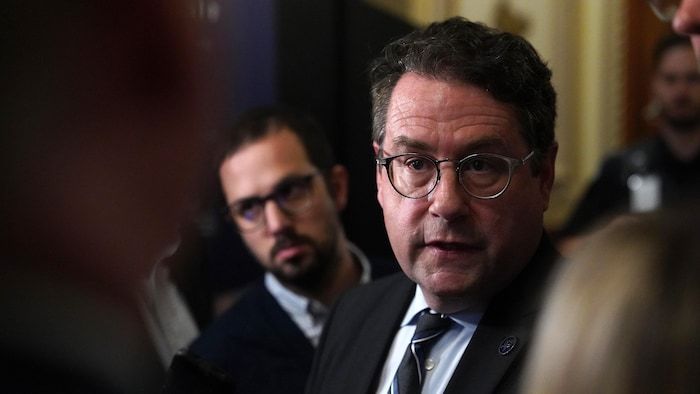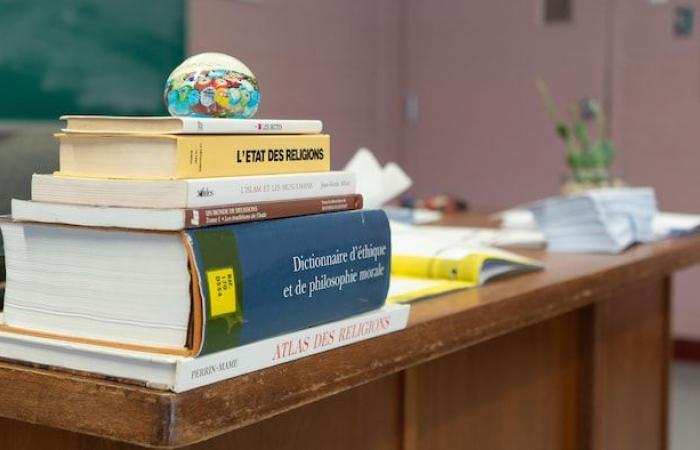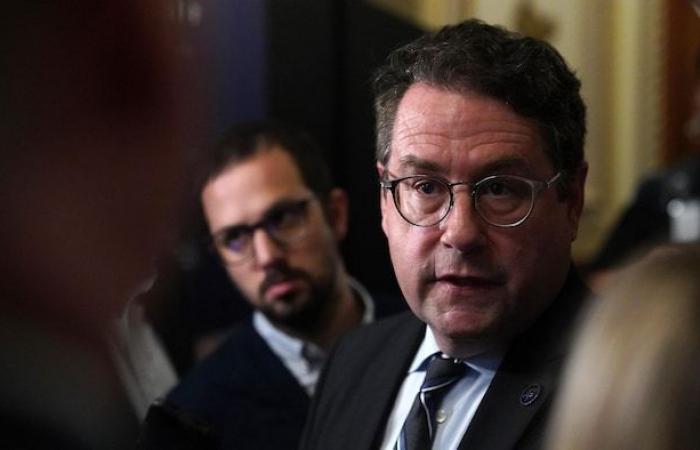Deprived of textbooks, teachers in the new Quebec Culture and Citizenship (CCQ) program must prepare their lessons on a small-week basis, with the means at hand, which leads to an overload of work. The first stage of the school year has barely ended when teachers are already on the verge of exhaustion. Their union is sounding the alarm.
The course CCQ replaced the Ethics and Religious Culture program in primary and secondary schools in Quebec. It is taught in all classes, with the exception of the third year of secondary school.
After a year of optional implementation in 2023-2024, the course became compulsory this year. However, publishing houses were not able to produce educational materials intended for students and teachers in secondary four and five in time for the start of the school year.
Build the plane in flight
Result: teachers must assemble their teaching materials and edit their lessons as the school year progresses. A situation deplored by the National Federation of Teachers of Quebec (FNEEQ).
Teachers need to have a foundation, to have a manual, a workbook, a basis on which to rely so as not to be in creation mode all the time, but rather in a class management position, where you can give your whole soul and then your whole heart to the course you are teaching, rather than being preoccupied and then overloaded because you are building the plane in flight
argues in an interview with - the vice-president of the FNEEQLéandre Lapointe.
Open in full screen mode
Léandre Lapointe is the vice-president of FNEEQ, a union which represents 40,000 teaching professionals in Quebec.
Photo : -
The Quebec Ministry of Education (MEQ) provides teachers of the years concerned with digital educational resources posted on the Open School platform. In addition, the ministerial training courses that were created in 2023-2024 are accessible on the YouTube channel of the MEQ.
Workload
However, these resources are not presented in a turnkey format. It is therefore up to teachers to sort through the material offered, which is not an easy task, argues Mr. Lapointe.
You still have to take all these resources, do research, put [tout] That [ensemble et] that you adapt them to your course. It requires a lot more work than if you had a textbook or teaching materials.
This is without taking into account that the material of the course CCQ is abundant and addresses many complex, delicate and polarizing topics ranging from sexual consent to artificial intelligence, racism and digital citizenship education.
Open in full screen mode
The Culture and Quebec Citizenship course replaced the Ethics and Religious Culture program. (Archive photo)
Photo: - / Frédéric Lacelle
These topics are the subject of class discussions during which the teacher, called upon to act as moderator, is constantly positioning himself as a neutral person
regarding sensitive issues. In this context, access to educational resources becomes even more important, insists Léandre Lapointe, who highlights the risks of overwork.
Fatigue
If your focus is just on building your course, that’s where overload happens. It’s November, we’ve just published the report cards, we’re currently at parent meetings. I would tell you that the teachers we represent are tired and it is just November
worries the vice-president of the FNEEQ.
There are teachers who ask themselves: “What will my state of health be like in January, in March? Am I going to be able to maintain this level of work, this workload until in June?”
Mr. Lapointe and the union he represents believe that the Legault government would have been wiser to implement the course gradually in order to ensure that teachers at different levels have access to all the necessary teaching materials.

Open in full screen mode
Sexuality education for students is now offered as part of the Quebec Culture and Citizenship program. (Archive photo)
Photo : Getty Images / Larisa Rudenko
It is also not said that all teachers giving the course CCQ will have a student manual and teaching guide on hand to refer to next year. A manual for teaching the program in Secondary IV is being produced, but the material for graduates is still pending.
November 7th MEQ published a notice of call for interest for the production and adaptation of a didactic set for teaching the program CCQ in the fifth year of secondary school. The ministry is unable to guarantee that the materials will be ready in time for the next school year.
The information obtained following this notice of call for interest will allow the ministry to define the terms of production and availability of this educational package. It is hoped that a manual, in whole or in part, will be available for the 2025-2026 school year.
specifies MEQ in an email addressed to -.
Accompaniement
The ministry recalls that it granted an optional year of implementation, in 2023-2024, to give those communities that desired more time to plan the implementation of the course. In addition to the resources made available to teachers on the web, the MEQ indicates that it has offered in-depth training to educational advisors and those responsible for sexuality education, whose role is to support teaching staff.
Other training and support sessions, intended for teaching staff, educational advisors as well as people responsible for sexuality education files, by the ministry are offered during the year 2024-2025, year of establishment required
he specifies.

Open in full screen mode
Following concerns expressed by many educators, the Minister of Education, Bernard Drainville, agreed to postpone the mandatory implementation of the CCQ program for one year. (Archive photo)
Photo : - / Sylvain Roy Roussel
The ministry also says it works closely with educational advisors to continually adjust the support offered to school staff and meet the needs of the network.
Trust
The arrival of a new program is a significant change that can cause concern. The experiences of testing in targeted schools in 2022-2023 and optional implementation in 2023-2024 allow us to affirm that the confidence of teaching staff is consolidated with the teaching of the program
says the MEQ.
Léandre Lapointe, for his part, hopes that the ministry will be able to accelerate the production of educational materials intended for fourth and fifth secondary teachers.
To avoid the pitfalls encountered with the course redesign CCQhe enjoins the MEQ to better plan future program revisions, in particular by promoting gradual implementation.
Quebec Newsletter
Subscribe to the ICI Québec newsletter.









